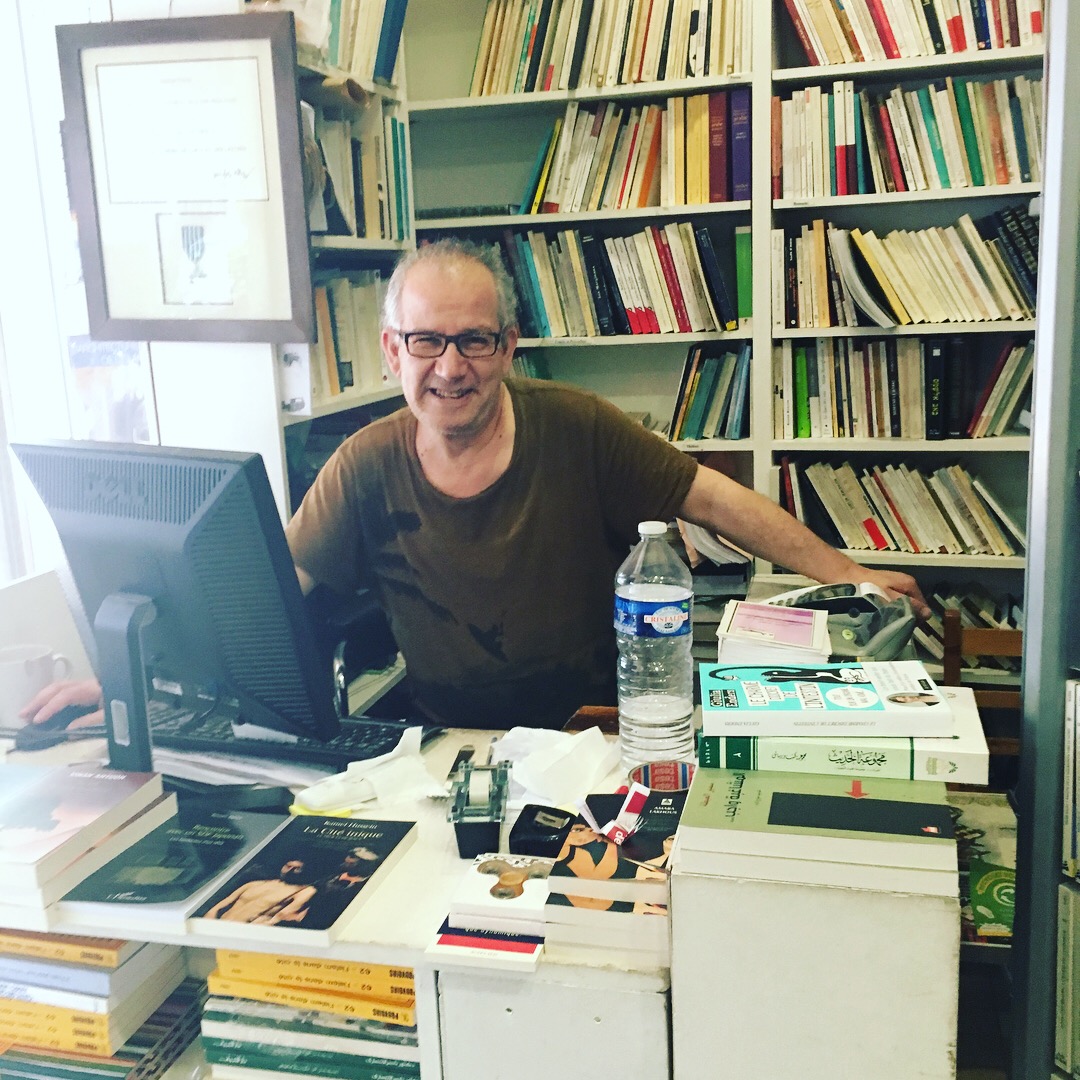Zeinab by Muhammad Husayn Haykal is usually referred to as the first Arabic novel, and has gone through numerous editions and translations since it was first published in Cairo in 1913. In Haikal’s introduction to the third edition, he describes the place that made him want to write a thoroughly Egyptian work of prose, explaining:
Zeinab is the fruit of a longing for the homeland, and everything within the homeland. It was drawn by a pen residing in Paris, filled with affection for Egypt, and yet taken both by the city and by French literature. (Haikal, p 11, translation my own)

Hashem Mouawieh in his Paris bookshop Avicenne Librairie, © July Blalack
In fact, Paris seems to come up again and again in Arabic literature, from Algerian novelist Ahlam al-Mustaghanemi’s stories of wistfully self-exiled men obsessing over their country of origin while living in Paris, to 19th century travelogues in which scholars such as Egyptian Rifa’ah Rafi’ al-Tahtawi and Moroccan Muhammed As-Saffar describe the curious ways of the Parisians. Additionally, the piece of Arabic literature which is most widely known outside of the region- for better or for worse- is very much a product of Paris. Antoine Galland brought ‘1001 Nights’ (also translated as ‘The Arabian Nights’) to an 18th-century European audience by adapting Arabic folktales he encountered in manuscripts and heard from a Syrian acquaintance.
Considering this history, along with the presence of a large Arabic-speaking diaspora in France, it is unsurprising that Paris is an incredible destination for fans of Arabic literature. Among the places to include in an Arabic-Parisian literary itinerary I recommend:
- Bibliothèque nationale de France holds an impressive collection of Arabic books and manuscripts. Many texts and sound files can be accessed online, so it’s worth browsing their database Gallica to see if the title you’re looking for has been digitized. A video about the Timbuktu Arabic manuscript collection and another showing an early manuscript of The Tales of Kalila and Dimna are also online. Although not all of the material included is in Arabic, the interactive digital portal about illuminated manuscripts in Islam is also fascinating.
- The Institut du Monde Arabe is housed in a beautifully-designed building and has three main collections: Islamic art, contemporary art, and ethnography. It also hosts temporary installations in addition to performances and literary events. Currently the temporary exhibit is ‘The Islamic Treasures of Africa: From Timbuktu to Zanzibar,’ a diverse and detailed collection including books, artwork, and several short documentaries related to Arabic literatures and Islamic cultures from different parts of sub-Saharan Africa.
- Avicenne Librairie (Avicenna Bookshop) is located adjacent to the Institut du Monde Arabe and has an incredible selection of both Arabic books and French translations of Arabic literature. (It was here, in fact, that I bought my own copy of Zeinab.) The owner, Hashem Mouawieh, has been based in Paris for over 30 years and has been visited by the likes of Edward Said and Mahmoud Darwish. Currently the Avicenne Librairie website is not working, but the address is 30 rue des Fossés-Saint-Bernard, 75005 Paris.
- Mahmoud Darwish Square overlooking the River Seine was dedicated by former mayor Bertrand Delanoë in 2010. In his dedication, Delanoë spoke of Mahmoud Darwish’s incredible poetry and his ability to express the longings of Palestinians in exile throughout the world. Darwish, like many other Arabic poets and writers, resided in Paris on-and-off throughout his life, and it is apt that his name is now among those integrated into the city’s streets and squares. The Jerusalem Fund mentioned this dedication as one of many Parisian activities celebrating Palestinian literature. The dedication was also covered by Al Jazeera in Arabic and by World Bulletin in English.
Have you had explored literature in Paris? Can you recommend any sites or bookstores? Please tell us in the comments!
Both the novel ‘Zeinab’ and the two travelogues mentioned in this post are available in English:
- Order Zeinab from Darf Publishers
- Read An Imam in Paris: Account of a Stay in France by an Egyptian Cleric (1826-1831) on Google Books
- Read Disorienting Encounters: Travels of a Moroccan Scholar in France in 1845 on Google Books
- Additionally, the forthcoming ‘Oxford Handbook of Arab Novelistic Traditions’ has a chapter on Arabic literature in France


Very informed